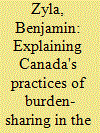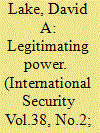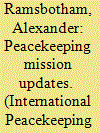|
|
|
Sort Order |
|
|
|
Items / Page
|
|
|
|
|
|
|
| Srl | Item |
| 1 |
ID:
124414


|
|
|
|
|
| Publication |
2013.
|
| Summary/Abstract |
This article analyzes the Government of Canada's decision to lobby the North Atlantic Treaty Organization (NATO) to lead the International Security Assistance Force (ISAF) in Afghanistan in 2003. Although studies have been conducted on Canada's choice to deploy to Kandahar province, the decision to lobby NATO, and the diplomatic efforts that resulted, have been given little attention. In addition, Ottawa's decision to propose joint leadership of the mission with Germany in 2003 warrants further study. This article considers three key motivations evident in the Canadian government's thinking-first, its view of deployment to Afghanistan as an alternative to deployment to Iraq; second, its interest in developing relations with Germany; and finally, its more general motivation to return to the conflict.
|
|
|
|
|
|
|
|
|
|
|
|
|
|
|
|
| 2 |
ID:
124413


|
|
|
|
|
| Publication |
2013.
|
| Summary/Abstract |
While Canadian burden-sharing practices within NATO in the 1990s are well documented, the data in the literature raise two central questions: (1) was the practice of Canadian burden-sharing a one-time event, or was it part of a larger pattern of practices? and (2) what factors motivated Canada to shoulder the burden to the extent that it did? This article studies the extent of Canada's burden-sharing practices in the context of the International Security Assistance Force (ISAF) mission in Afghanistan. The article makes two arguments: first, Canada's commitment to NATO continued to be strong post-9/11; second, Canada's practices of sharing Atlantic burdens can be explained by its adherence to the norm of "external responsibility," which guided its foreign policy by appealing to Canada's humanitarian responsibilities to contribute at an extraordinary level to the promotion and maintenance of international peace and security.
|
|
|
|
|
|
|
|
|
|
|
|
|
|
|
|
| 3 |
ID:
124375


|
|
|
|
|
| Publication |
2013.
|
| Summary/Abstract |
The United States has maintained international hierarchies over the Western Hemisphere for more than a century and over Western Europe for nearly seven decades. More recently, it has extended similar hierarchies over states in the Middle East. How does the United States exercise authority over other countries? In a world of juridically sovereign states, how is U.S. rule rendered legitimate? Hierarchy has interstate and intrastate distributional consequences for domestic ruling coalitions and regime types. When the gains from hierarchy are large or when subordinate societies share policy preferences similar to those of the United States, as in Europe, international hierarchy is possible and compatible with democracy. When the gains from hierarchy are small and the median citizen has policy preferences distant from those of the United States, as in Central America, international hierarchy requires autocracy, and the benefits of foreign rule will be concentrated within the governing elite. In the Middle East, the gains from hierarchy also appear small, and policy preferences are distant from those of the United States. As a result, the United States has backed sympathetic authoritarian rulers. Although a global counterinsurgency strategy might be viable over the long term, the costs of establishing effective hierarchies in the region imply that the United States is better off retrenching "East of Suez."
|
|
|
|
|
|
|
|
|
|
|
|
|
|
|
|
| 4 |
ID:
124434


|
|
|
|
|
| Publication |
2013.
|
| Summary/Abstract |
Based on a theoretical concept that distinguishes different dilemma types, the article identifies and analyses dilemma situations that arose for the international UN-led peace-building operation in its efforts to combat organised crime in post-war Kosovo. In order to cope with the various dilemmas that arose, the international peace-building operation engaged in compromises that entailed strategic trade-offs. Dilemmas and respective trade-offs in decision-making pertain to the fields of post-conflict security, political inclusion of post-conflict stakeholders, disarmament and demobilization, transfer of ownership, rule of law and local economy.
|
|
|
|
|
|
|
|
|
|
|
|
|
|
|
|
| 5 |
ID:
124450


|
|
|
|
|
| Publication |
2013.
|
| Summary/Abstract |
All members of the National Commission for Dialogue and Reconciliation, including its President and Vice-Presidents, officially took office in March and April. There was criticism in some quarters that the selection process for membership had not been transparent and that there had been inadequate inclusion of religious, community and traditional leaders.
|
|
|
|
|
|
|
|
|
|
|
|
|
|
|
|
|
|
|
|
|